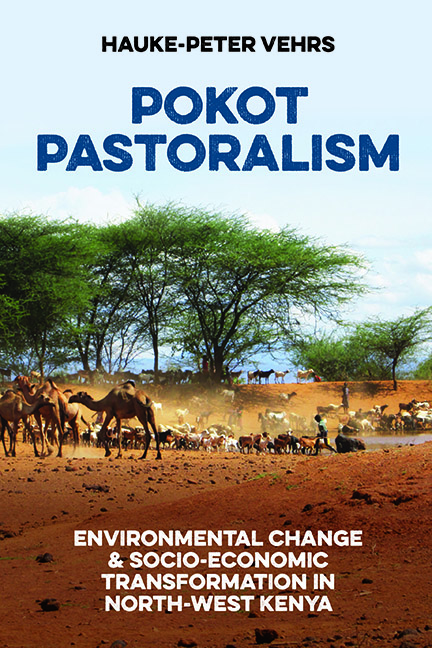Book contents
- Frontmatter
- Dedication
- Contents
- List of Illustrations
- Preface and Acknowledgements
- List of Abbreviations
- 1 Introduction
- 2 East Pokot: A Place and its People
- 3 Pokot Pastoral Livelihoods
- 4 The Paka Community
- 5 Environmental Changes in East Pokot
- 6 Socio-Ecological Transformations in the Agro-Pastoral Highlands
- 7 Ecological Change and Local Livelihoods: Scientific and Pokot Perspectives
- 8 Ecological Invasions: Agents of Socio-Ecological Transformation
- 9 Ecological Challenges and Social Transformations
- Appendix: Lists of Plant Names (Pokot–Scientific and Scientific–Pokot)
- Bibliography
- Index
- Future Rural Africa
3 - Pokot Pastoral Livelihoods
Published online by Cambridge University Press: 16 July 2022
- Frontmatter
- Dedication
- Contents
- List of Illustrations
- Preface and Acknowledgements
- List of Abbreviations
- 1 Introduction
- 2 East Pokot: A Place and its People
- 3 Pokot Pastoral Livelihoods
- 4 The Paka Community
- 5 Environmental Changes in East Pokot
- 6 Socio-Ecological Transformations in the Agro-Pastoral Highlands
- 7 Ecological Change and Local Livelihoods: Scientific and Pokot Perspectives
- 8 Ecological Invasions: Agents of Socio-Ecological Transformation
- 9 Ecological Challenges and Social Transformations
- Appendix: Lists of Plant Names (Pokot–Scientific and Scientific–Pokot)
- Bibliography
- Index
- Future Rural Africa
Summary
Unlike many other pastoralists in East Africa, the origin of those in East Pokot has a rather short history. A pastoral section did not split off from the agropastoral Pokot in today's West Pokot County until the middle of the eighteenth century. Nonetheless, the Pokot pastoralists quickly became very successful herders, accumulating large flocks and effectively asserting themselves against other pastoral groups in the region.
In this chapter, I discuss the formation of pastoralism in East Pokot and describe the origin and history of the pastoralists in a contested region, their social organisation and land management over time and, finally, recent population developments and livestock herd transformations. To understand the transformation processes of pastoral livelihoods, it is first necessary to take a closer look at the term ‘pastoralism’ itself. Given a clear definition of the term, the pastoral livelihoods of the Pokot can, at a later stage, be compared with other livelihood approaches. Fratkin and Smith (1994) provide an elaborate definition that accounts for the complexity of pastoral livelihoods in East Africa. This also fits the pastoral Pokot who still depend on livestock husbandry, although farming, wage labour, trade and other activities have become more important in recent years.
For the most part, this production is subsistence based, aimed at producing foods (primarily milk) for household members. Exchange is secondary. Pastoralists trade livestock, hides, or milk for other food products (or money to purchase them) including grains, tea, and sugar. Production is often organized within household units consisting of a male stock owner, his wife or wives, children, and other dependents. Seldom, if ever, do women have control of the herds … The household head is responsible for herd management and family subsistence and makes decisions to adjust to changing conditions in natural resources (i.e., land, including rainfall, vegetation, free water, salt, insects, and the presence of enemies or predators), livestock (individual feeding and watering regimens, reproductive behavior, and exposure to and treatments for diseases), and labor (access to which is influenced by changes in household composition, warfare, drought, education, urban migration, and wage availability). (Fratkin & Smith, 1994, pp. 93–4)
- Type
- Chapter
- Information
- Pokot PastoralismEnvironmental Change and Socio-Economic Transformation in North-West Kenya, pp. 34 - 66Publisher: Boydell & BrewerPrint publication year: 2022



